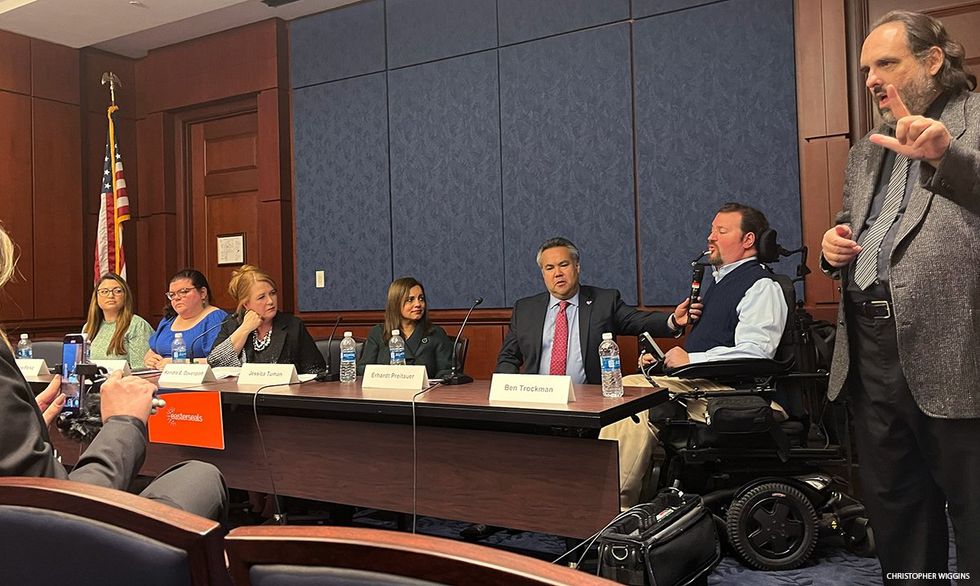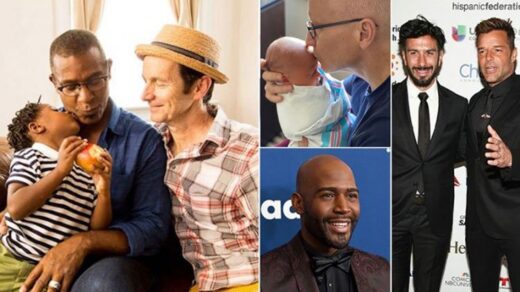Meet Ben Trockman, the Disability Rights Activist Challenging the Status Quo
Author: Christopher Wiggins
The last time Ben Trockman flew was more than 17 years ago.
Despite occasionally traveling to different parts of the country for speaking engagements, the 34-year-old disability rights advocate uses an accessible van because flying with his motorized wheelchair is inconvenient and virtually impossible due to the danger and indignity involved.
As a 17-year-old, Trockman suffered a spinal cord injury while riding a motocross bike. After being paralyzed from the neck down, his life changed instantly. He tells The Advocate that despite going through a five-year grieving process after his accident, he’s grateful for the opportunity to advocate for the community.
Almost 10 years ago, Trockman led the effort to get Congress to pass policies that ensured airplane travel for people with disabilities. Trockman was in Washington, D.C., last week for a weeklong series of activities as part of Easterseals’ publication of the report, “The State of Disability Equity and Access” and a policy forum.
Trockman can control every aspect of his daily mobility by using a sip-and-puff system designed for people without upper extremity function. In addition, all wheelchair and seating functions are controlled by converting breath pressures into non-proportional commands and controls.

The first thing Trockman notes is while some may pity him, he considers himself exceptionally fortunate to have a family that supports him and makes this life possible for him.
“Not everybody has the benefits and access I have, and I recognize that and want to be sure to acknowledge it,” he says.
Trockman went on to earn a communications degree after graduating high school after his accident. After graduating, he received an internship with a local radio station thanks to his captivating voice, sharp wit, and humor, but the hours posed an enormous obstacle.
“I have somebody with me at all times, and that person has to be compensated through whatever source, whether it’s me paying out of pocket or through home healthcare folks paid through Medicaid,” he says. “As I thought about whether I want to pursue a six-to-midnight job to find someone who can work with me at those times — it’s already hard to find people — I just found that this was something that wasn’t going to work for me.”
During his college years, he was approached by Easterseals about becoming a representative for the organization. This experience led him to develop an interest in advocacy and public speaking. After graduating in 2014, he says, “The previous experience of advocacy and working with public relations and communications staff was just right for me.”
Easterseals is a nonprofit organization that advocates for and supports the rights of people living with apparent and non-apparent disabilities.
Trockman also prepared himself for his next career move through his 8-year employment at a bank in diversity and inclusion matters.
His hometown of Evansville, Ind., is heavily Republican, and Trockman successfully ran for city council as a Democrat. The campaign for his reelection is currently underway.
Trockman represented Easterseals at the Washington Hilton event, where President Joe Biden spoke at the Building Trades Unions Legislative Conference.
Trockman’s experience illustrates that access to the workforce is another barrier people take for granted.
Obtaining a suitable job is also a critical part of the struggle for people with disabilities in the United States. Unfortunately, employers and companies still underestimate the talents of people with disabilities.

Trockman emphasizes that disabled people must be able to get to where they’re going even before they can participate in the dignity of work. But the lack of curb cuts makes getting on and off sidewalks difficult, and flying with a wheelchair poses numerous risks.
Since 1990, the Americans with Disabilities Act has been in place. Yet there has been a slight improvement in flying ability for wheelchair users.
For those who make it onboard a plane, only wide-body jets must have accessible bathrooms. Since most domestic flights are on narrow-body jets, restrooms are not accessible.
Most people with mobility disabilities are forced to starve themselves and plan their liquid intake around flights to avoid using the restroom while in the air.
When someone can lift themselves or be lifted out of a wheelchair and into an airplane seat, they can use an aisle chair to board or disembark, but they must usually wait until everyone else has exited the plane before being taken off. Those who rely on wheelchairs also worry about whether their chairs will arrive at their final destination. How was the chair when it arrived? Did it seem to be in good condition?
Every day, six to eight wheelchairs are damaged in flight, according to the Department of Transportation.
Flying is impossible for people like Trockman, who cannot leave their wheelchairs because there is no space on the aircraft to ride their wheelchairs into and secure themselves.
“As it stands today, when you arrive at the airplane as a disabled person who relies on a wheelchair, you’re stripped of the thing that makes you independent,” Trockman says. “So, you’re stripped of that device, my chair, and then there’s a great possibility that at the end of the flight, it’s returned in not good condition. It’s demoralizing.”
Those without disabilities might find the following analogy useful.
“It’s literally taking your legs away from you and putting them underneath the plane and then returning them to you after everybody else gets off the plane,” he says. “And then, you put your legs on, and they don’t work right because somebody broke them. That’s what we’re dealing with if we’re lucky.”
Modern airliners now offer first-class cabins in which passengers can be treated to a suite to themselves, and most long-haul flights are equipped with seats that can lie flat, but wheelchair-dependent passengers are still not accommodated in any way.
Technologies exist to allow people with disabilities to remain in wheelchairs during flights. However, the airline industry and regulators haven’t moved to implement them.
AllWheelsUp Front And Rear Entrywww.youtube.com
According to Trockman, most of these advancements could be easily implemented if the public demanded them.
Because he was once oblivious to what life was like for those with disabilities, he knows what most people don’t realize about it.
“Back 17 years ago when my injury happened, prior to that time, my family and I never talked about disability,” Trockmans says. “It wasn’t part of our natural conversation. I knew some kids with disabilities in my high school, but this was not part of the common culture or language from me. And just like any other issue that we might discuss today — take families to whom a loved one comes out as LGBTQ+ — some people just don’t know until they’re affected. So, we had a really quick learning lesson.”
“It’s not too long ago that we had a president who, for four terms, was afraid to share with the public that he had a disability,” Trockman says, referring to President Franklin D. Roosevelt hiding his wheelchair use. Trockman had seen the Franklin D. Roosevelt Memorial on his way back to the Washington Hilton for The Advocate interview. He adds, “It wasn’t too long ago that we just signed the best law we could at the time to help protect rights for people with disabilities — I’m just barely older than the ADA.”
Trockman says most people don’t have to look too hard to find a person they know with a disability.
“Not everybody is aware of disability issues, but once you become aware and once you become more comfortable talking about the issues, you realize that wow, there are more people out there that are affected by some limitation or disability, or they have a loved one,” he says. “And it’s really just creating a culture where it’s okay too that there is a disability pride month, and it should be celebrated.”
From Your Site Articles
Original Article on The Advocate
Author: Christopher Wiggins






